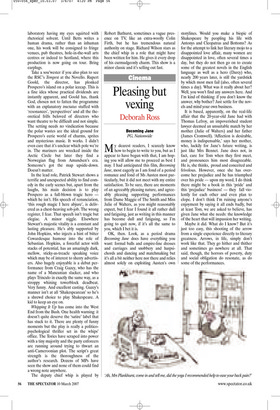Pleasing but vexing
Deborah Ross
Becoming Jane PG, Nationwide My dearest readers, I scarcely know how to begin to write to you, but as I appear to have begun with that, I am hoping you will allow me to proceed as best I may. I had anticipated this film, Becoming Jane, most eagerly as I am fond of a period romance and fond of Ms Austen most particularly, but it did not meet with my entire satisfaction. To be sure, there are moments of an agreeably pleasing nature, and agreeably pleasing supporting performances from Dame Maggie of The Smith and Miss Julie of Walters, as you might reasonably expect, but I fear I found it all rather dull and fatiguing, just as writing in this manner has become dull and fatiguing, so I’m going to quit now, if it’s all the same to you, which I bet it is.
OK, then. Look, as a period drama Becoming Jane does have everything you want: formal balls and empire-line dresses and carriages and snobbery and harpsichords and dancing and matchmaking but it’s all a bit neither here nor there and relies almost solely on exploiting Austen’s own storylines. Would you make a biopic of Shakespeare by peopling his life with Antonys and Cleopatras and Bottoms? As for the attempt to link her literary mojo to a disappointed love affair, many women are disappointed in love, often several times a day, but they do not then go on to create some of the greatest novels in the English language as well as a hero (Darcy) who, nearly 200 years later, is still the yardstick by which most men fail (also, often several times a day). What was it really about her? Well, you won’t find any answers here. And I’m kind of thinking: if you don’t know the answer, why bother? Just settle for the novels and mind your own business.
It is based, apparently, on the real-life affair that the 20-year-old Jane had with Thomas Lefroy, an impoverished student lawyer deemed an unsuitable match by her mother (Julie of Walters) and her father (James Cromwell). ‘Affection is desirable, money is indispensable,’ says her mother, who, luckily for Jane’s future writing, is just like Mrs Bennet. Jane does not, in fact, care for Tom when they first meet, and pronounces him most disagreeable. He is, she thinks, proud and conceited and frivolous. However, once she has overcome her prejudice and he has triumphed over his pride — upon my word, I do think there might be a book in this ‘pride’ and this ‘prejudice’ business! — they fall violently for each other and even plan to elope. I don’t think I’m ruining anyone’s enjoyment by saying it all ends badly, but at least Tom, we are asked to believe, has given Jane what she needs: the knowledge of the heart that will impassion her writing.
Maybe it did. What do I know? But it’s just too easy, this shooting of the arrow from a single experience directly to literary greatness. Arrows, in life, simply don’t work like that. They go hither and thither and sometimes go nowhere at all. That said, though, the horrors of poverty, duty and social obligation do resonate, as do some of the performances. James McAvoy, who I’m pleased to say appears to have recovered fully from his adventures in Uganda, is Lefroy and he is quite excellent: sexy, cheeky, charismatic, credible. I’d have him in the back of a chaise and four. But Anne Hathaway as Jane? Here’s the thing: Anne Hathaway nails the accent, looks gorgeous dashing across the hills in a billowing red dress to watch the boys skinny-dipping — I’m not sure McAvoy’s bare botty is up there with Colin Firth’s wet shirt, but it’s a joy all the same — and is exquisitely beautiful, with very fine, dark eyes. However, there is, alas, absolutely no sense of an inner life behind those eyes, or even any sign of intelligence. She is occasionally given prickly or ironic things to say, but they are bolt-ons, included to remind us that this is not just a lovesick wuss, this is Jane Austen, and it is all clunkingly obvious. Anna Maxwell Martin, who starred in the BBC’s Bleak House and plays Jane’s sister, Cassandra, does have the required depth and weight and can say more with a glance than Hathaway ever says in the entire film. I wish they’d cast her as Jane. And as for the very final scene, when Tom and Jane meet up again years later, the false ageing is so bizarrely false it’s almost deranged.
Go or don’t go to this film. I care not a jot. But, if you do, leave behind any expectation of being enlightened. You will not be, and might even end up quite vexed.



























































































 Previous page
Previous page